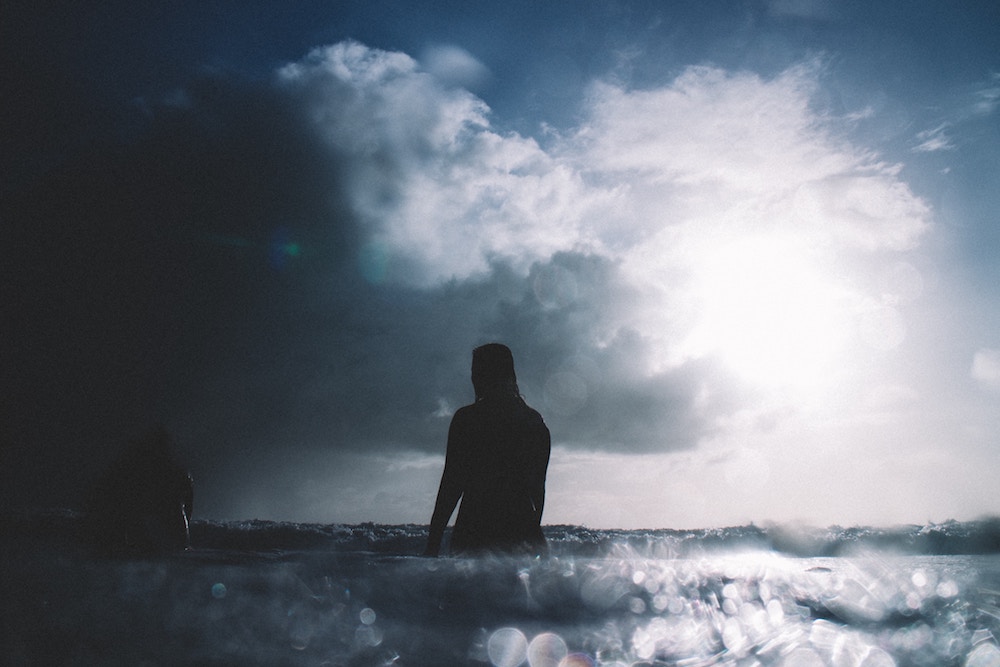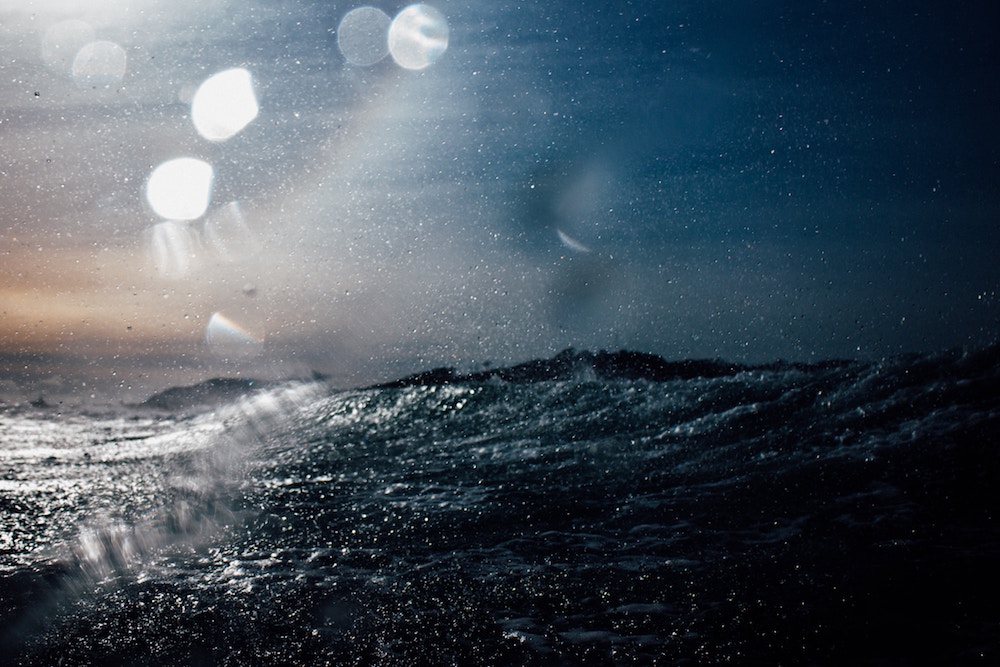Essay by Eric Stinton
Floating Free—If Only for a Moment

I decided to swim in the storm.
After living in landlocked Seoul for four years, I refused to allow a measly tropical storm—the meteorological category right under hurricane—to ruin my weeklong vacation back home in Hawaii. Storm categories are determined by average sustained wind speed, and while tropical storms aren’t strong enough to peel roofs off houses, they do get names. This one in 2018 was assigned Olivia.
Officially, storms are named to clarify communication between scientists and everyone else, but the act of naming clarifies other things, too. Names become boundaries by which we see shape. Naming helps to make sense of powers unseen yet undeniably felt, forces like the wind that, until their inexorable exit, are in a perpetual state of arrival.
• • •
My mom makes a daily decision to be either exhausted or in pain. Most days, she chooses exhaustion.
—Your mother has the gift of discernment.
My dad tells me this on the ride home from the airport. After nine years working at the Bible college, she was pushed into retirement six months early against her will. She saw it coming but couldn’t stop it. In Christianese, discernment is considered a “spiritual gift” that allows someone to determine whether a spiritual force originates from God, evil, or within the human soul.
Rheumatoid arthritis is a forked- and silver-tongued devil that tricks the immune system—whose sole purpose is to discern pathogens from its own healthy tissues—into attacking joints as it would a virus. Cartilage slowly erodes. Bones scrape against each other like tectonic plates. Joints loosen and deform. Damage can’t be reversed. There is no cure. It just comes and comes and comes, forever—“forever” being the length of a human life. Any other kind of forever is abstract theory, pure speculation.
My 68-year-old mother, whose daily reality has always been dedicated to matters of the spirit, now spends her waking life fighting phantoms.
• • •
I jogged into the water and dove in. Thousands of miles away from their open-ocean genesis, storm swells reached their ultimate revelation and rolled into mounding waves. Sand from the ocean floor stirred into colloidal suspension, the swells churning up the tiny particles before they got a chance to fall back to the floor. The water was warm.
The sky scrolled above me. Clouds hurried in the wind, a reminder that they are real objects and not just texture. The setting sun splashed gold and pink streaks across dark-gray rain clouds. Bloated puffs in the distance dragged sheets of rain behind them like the tentacles of a man o’ war.
Life swirled around me. I bobbed and splashed in the chaos.
Flotsam bumped into me and moved along with aimless insouciance. The waves crashing on shore retreated back to the ocean’s expanse, while sets continued to roll in. I was caught between.
• • •
—Grandma didn’t always have wrinkles.
My mom says this to my five-year-old niece, who is fascinated by the elastic pleasures of aging skin.
—Grandma used to be beautiful.
—I like the wrinkles, my niece says.
When I was a little older than my niece is now, my mom loved reading the Left Behind novels about life on Earth after all the True Believers have been taken to heaven. She'd think aloud about how it would feel to meet Jesus in the air and transcend the physical realm. Almost conspiratorially, she'd voice her belief—half-hunch, half-longing—that Jesus would return in her lifetime. I didn’t understand then that her hope to experience the rapture was also a hope to not experience something else.
She still resides Elsewhere, albeit in a more secular, concrete version. She talks of moving to British Columbia or California, of traveling to Europe. The adventurousness of her youth took a thirty-year detour when she became a mother of four boys. Now, she’s trying to make up for lost time.
—I want to see all the places I’ve always wanted to, before….
She trails off and heads to her room to lie down.
• • •

The waves were mid-sized, but too crumbly and disorganized to bodysurf for more than a few seconds. I caught one and was driven head-and-shoulder-first into the shore. I emerged scraped and lightheaded and deliriously happy. Baptism through abrasion.
I let the current suck me feet-first into the waves. When they started to crash, I tucked my knees into my chest and flipped underwater. Sand and saltwater rushed through my nostrils.
But mostly, I just was, there in the water. The only difference between me and everything else getting pushed along by the storm was that I had the ability to choose: to ride the wave, to use its unstoppable force for my own leisure—or to fight against it.
• • •
—I have one request for you before you leave.
My mom holds out a small cardboard box as I pack my suitcase to go back for a fifth year in Korea. I never intended to stay away so long. I left when I was 26, bored and debt-ridden; at thirty, I’m traveled and financially solvent. Yet it doesn’t quite feel like I’ve moved on from my adolescence. Moving on also means leaving behind. I’ve been caught between Korea and Hawaii, pulled back to one while I stretch toward the other.
I’ve never been able to process what it means to have left my mom behind for so long. I can explain it as if we’re meteorological phenomena, perpetually cycling apart, but that satellite view only magnifies the distance between us and the extent of my guilt.
Inside the box from my mom is a vial for me to fill up with saliva and send to a lab to find out the precise percentages of my ancestry. My mom has obsessed over this sort of thing for the last few years—our genetic heritage, our ancestors’ role in the American Revolution, when and how they migrated across Europe and the US. I’m not sure why. Maybe it’s simple curiosity; maybe it’s a longing to feel the existential balm of being in the middle of a larger narrative, one that continues on after her own individual story has finished.
I gladly spit in the tube and seal it for shipment, though I don’t care about the results. Words like Scottish, Welsh, Irish, and Jewish don’t mean much to me, since none are mine in any identifiable way beyond my saliva. They represent where I’ve been about as much as my name represents who I am. The purpose of naming something—Olivia for a storm, agnostic or Christian for a person, methotrexate for a daily routine—is to delimit the vast, to objectify the ineffable, to confront the terrifying. You don’t always have to see something directly to know it’s there.
My mom and I chat about our ancestry and my plans to move back home. The next time I see her, I’ll be back for good, though she made it clear in her distinctly passive way that she’d prefer me to settle somewhere other than Hawaii. Two of my three brothers live on the mainland, so if I were to join them, there would be ample reason for my parents to sell the house and move somewhere she’d rather be. All this seems important in the moment, despite the uncertainty that there will be a next time I’ll see her.
She’s tired again. She exhales heavily and retreats back to her room, leaving me in the dumb silence of words unspoken.
• • •
Sheets of cold rain fell under the darkening sky, the warmth retreating. Soon I'd trudge through the whitewash back to shore, resisting the ocean, those whispers that pierce through the static roar, coaxing me to come back, just for a little longer. I could barely make out the path to the car on shore. That dimly illuminated line would take me back to my mom, back to everything I left behind and came back for. The weightlessness of the ocean would be replaced by the familiar tug of the world.
But not yet. I was still free in the water. I could move in any direction or be motionless, momentarily disconnected from everything—my life back in Korea, my plans to move home, that nagging feeling that had loomed like a storm cloud ever since I got back and noticed how much and how quickly my mom was slowing down.
The wind skipped across the surface and chilled whatever skin was exposed. I huddled into the warmth of the water, clinging to its comfort. The ocean eddied around me. The sky crawled forward in perpetual arrival. The expanses above and around and within stretched out infinitely in all directions. I floated in absolute freedom, buoyant with potential.
Art Information
- “Surfers Sitting on Boards (Piha Beach, New Zealand)" and "Muriwai Beach, Muriwai, New Zealand" © Tim Marshall; public domain.
 Eric Stinton lives with his fiancée and dachshund in his hometown of Kailua, Hawaii. He writes a weekly column for Sherdog, and his fiction, nonfiction, and journalism have appeared in Bamboo Ridge, The Classical, Harvard Review Online, Honolulu Civil Beat, Medium, and Vice Sports, among others.
Eric Stinton lives with his fiancée and dachshund in his hometown of Kailua, Hawaii. He writes a weekly column for Sherdog, and his fiction, nonfiction, and journalism have appeared in Bamboo Ridge, The Classical, Harvard Review Online, Honolulu Civil Beat, Medium, and Vice Sports, among others.
You’ll find his work at Eric Stinton’s website or follow him on Twitter at @TombstoneStint.
